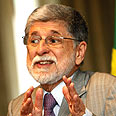
Turkey: Iran favors talks with EU after Ramadan
Speaking before meeting with Iranian, Brazilian foreign minister, Turkey's Davutoglu said Ankara trying to revive international negotiations on Tehran's nuclear program as soon as possible
Turkish Foreign Minister Ahmet Davutoglu said on Sunday that Iran had expressed willingness to have talks with the European Union about its nuclear program after the end of the month of Ramadan in early September.
Speaking before a lunch meeting with Iranian Foreign Minister Manouchehr Mottaki and their Brazilian counterpart Celso Amorim, Davutoglu said Ankara was trying to revive the international negotiations as soon as possible.
The West fears Iran's secretive uranium enrichment program is a veiled quest to develop nuclear weapons capability. Tehran denies this, saying it seeks only electricity from enrichment so it can export more of its oil wealth.
Catherine Ashton, the EU's foreign affairs chief, wrote to Iran's chief nuclear negotiator Saeed Jalili last month inviting him to resume negotiations.
"Mr Mottaki confirmed that he was in favor of the meeting after Ramadan. Obviously that depends on the flow of developments, but nobody is against holding the meeting in principle," Davutoglu said.
He was referring to comments made by Mottaki before his latest visit to Turkey. The Muslim fasting month of Ramadan ends in the first half of September.
"As soon as possible we are trying to start negotiations again between Iran and P5+1 and we will also do our best in order to start the technical negotiations as soon as possible," the Turkish foreign minister added.

United Front. Amorim and Davutoglu in Istanbul (Photo: AFP)
The P5+1 comprise the five permanent members of the UN Security Council – the United States, Britain, France, Russia and China – as well as Germany who have been locked in a protracted standoff with Iran over its nuclear ambitions.
Iran, Turkey and Brazil reached a deal in May under which Tehran agreed to send some of its enrichment uranium stockpile abroad, reviving a plan drafted by UN nuclear watchdog with the aim of restraining the disputed program.
The accord failed to prevent intensified sanctions from the United Nations, European Union and United States adopted over the past two months. But Davutoglu has said he still saw a chance of Iran doing the swap on the basis of their agreement.
Under the May deal, Iran agreed to transfer 1,200 kg (2,646 lb) of low-enriched uranium (LEU) to Turkey within a month and in return receive, within a year, 120 kg of 20 percent-enriched uranium to keep Tehran's medical research reactor running.
But Western diplomats said removing from Iran 1,200 kg – enough, if highly enriched, to make a nuclear weapon – was less significant than when it was first brokered in October last year because Iran's stockpile had doubled in the interim.
At the time of the original deal in principle, which Iran backed out of soon afterwards, 1,200 kg represented about 70% of the country's known LEU reserve.
The Security Council imposed a fourth round of sanctions on Iran on June 9. Brazil and Turkey voted against, angry at the West's dismissal of their deal which they said made new sanctions unnecessary.
- Follow Ynetnews on Facebook










